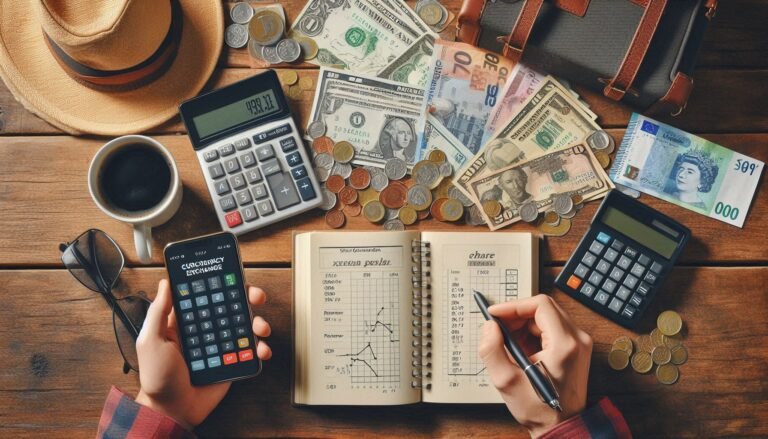Strong vs. Weak Currencies: How It Affects Your Travel, Investments, and Business
Currency strength plays a vital role in the global economy, influencing everything from travel costs to investment returns and business profitability. But what exactly makes a currency strong or weak, and how does it impact your financial decisions?
In this article, we’ll break down the differences between strong and weak currencies, how they affect travel, international investments, and businesses, and what you can do to make the most of currency fluctuations.
What Defines a Strong or Weak Currency?
Strong Currency
A strong currency means it has high purchasing power compared to other currencies. In simple terms, your money can buy more goods, services, or foreign currency than before.
- Typically found in stable economies with low inflation and strong economic growth
- Boosted by high demand in global trade and investment
- Strengthened by higher interest rates, political stability, and strong exports
Example:
If 1 USD was worth 100 Japanese yen (JPY) last year but is now worth 110 JPY, the USD has strengthened against the yen. This means American travelers can buy more in Japan for the same amount of dollars.
Weak Currency
A weak currency has lower purchasing power, meaning you need more of it to buy the same amount of goods or foreign currency as before.
- Often caused by high inflation, economic instability, or lower demand in forex markets
- Leads to more expensive imports and higher costs for businesses and travelers
- Encourages foreign investment in the country due to cheaper assets
Example:
If 1 GBP (British Pound) was worth 1.40 USD but drops to 1.25 USD, the GBP has weakened. This means British travelers now need more pounds to buy the same amount of U.S. dollars, making American trips more expensive.
How Currency Strength Affects Your Travel
If You’re Traveling with a Strong Currency
- Your money goes further in weaker-currency countries
- Hotels, dining, and shopping become cheaper
- Popular tourist destinations may offer better deals
Example:
A strong USD means Americans traveling to Thailand (where the Thai baht is weaker) get more baht per dollar, making Thailand a more affordable travel destination.
If You’re Traveling with a Weak Currency
- Trips to strong-currency countries become expensive
- Exchange rates favor the stronger currency, increasing travel costs
- You may spend more on essentials like food, accommodation, and activities
Example:
If the British pound weakens against the euro, U.K. travelers visiting Europe pay more for hotels, food, and transportation compared to previous years.
Travel Tip:
- Exchange money when your domestic currency is strong
- Use a travel-friendly credit card with no foreign transaction fees
How Currency Strength Affects Your Investments
If You’re Investing with a Strong Currency
- Better opportunities for foreign investments since assets abroad become cheaper
- Higher returns when investing in weaker-currency markets
- Can lead to higher forex trading profits
Example:
If the U.S. dollar is strong, U.S. investors can buy more shares in European stocks or real estate for the same amount of money.
If You’re Investing with a Weak Currency
- Your domestic investments become more attractive to foreign investors
- International investments may yield higher returns if your currency strengthens later
- If your investments are in foreign assets, returns may be reduced when converted back
Example:
If the Indian Rupee weakens, foreign investors might buy Indian real estate and stocks at a lower cost, expecting them to rise in value when the currency stabilizes.
Investment Tip:
- Consider diversifying your portfolio with both strong- and weak-currency investments
- Use hedging strategies to protect against currency fluctuations
How Currency Strength Affects Businesses
If You’re a Business Owner with a Strong Currency
- Easier to import goods and raw materials at lower costs
- Foreign travel and expansion become more affordable
- Selling to weaker-currency markets may be challenging as your goods become more expensive
Example:
A strong U.S. dollar makes importing Chinese electronics cheaper, but U.S. exports become more expensive for international buyers.
If You’re a Business Owner with a Weak Currency
- Exports become more attractive to foreign buyers
- Domestic products are cheaper for international customers
- Importing raw materials becomes more expensive
Example:
If the Japanese yen weakens, Japan’s exports (such as cars and electronics) become cheaper for U.S. buyers, boosting sales for Japanese companies.
Business Tip:
- If exporting, take advantage of a weaker domestic currency to attract international customers
- If importing, consider bulk purchasing before currency fluctuations increase costs
How to Take Advantage of Currency Strength Fluctuations
For Travelers:
- Travel to countries where your currency is stronger for cheaper trips
- Exchange money in advance when your currency is at a favorable rate
For Investors:
- Invest in foreign stocks, ETFs, and real estate when your currency is strong
- Hedge currency risks using forex trading strategies or multi-currency accounts
For Businesses:
- Export more when your domestic currency is weak
- Secure forward contracts to lock in exchange rates for future imports
Final Thoughts
Understanding how strong and weak currencies affect your travel, investments, and business can help you make smarter financial decisions. By staying informed on exchange rate trends, you can time currency exchanges, optimize investments, and take advantage of global opportunities.







